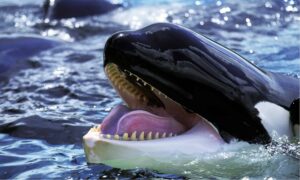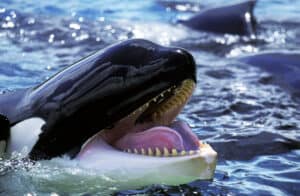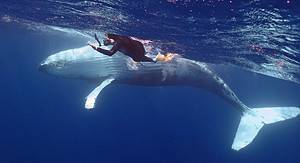Although whales may seem like they’ve been around as long as dinosaurs, the creatures we know as whales are only about 34 million years old. Before that, their ancestors were vastly different creatures that spent a significant portion of their lives on land! All this may sound confusing, so we’re going to take a look at the oldest whale fossil ever and explore the origins of these creatures!
Specifically, we are going to focus on the oldest fully aquatic whale ancestors. After all, whales descended from terrestrial creatures. Since those animals are probably not the ones most people are interested in learning about, we’re going to consider only those animals that lived in the oceans.
Get ready to take a deep dive into whales!
What Is the Oldest Whale?
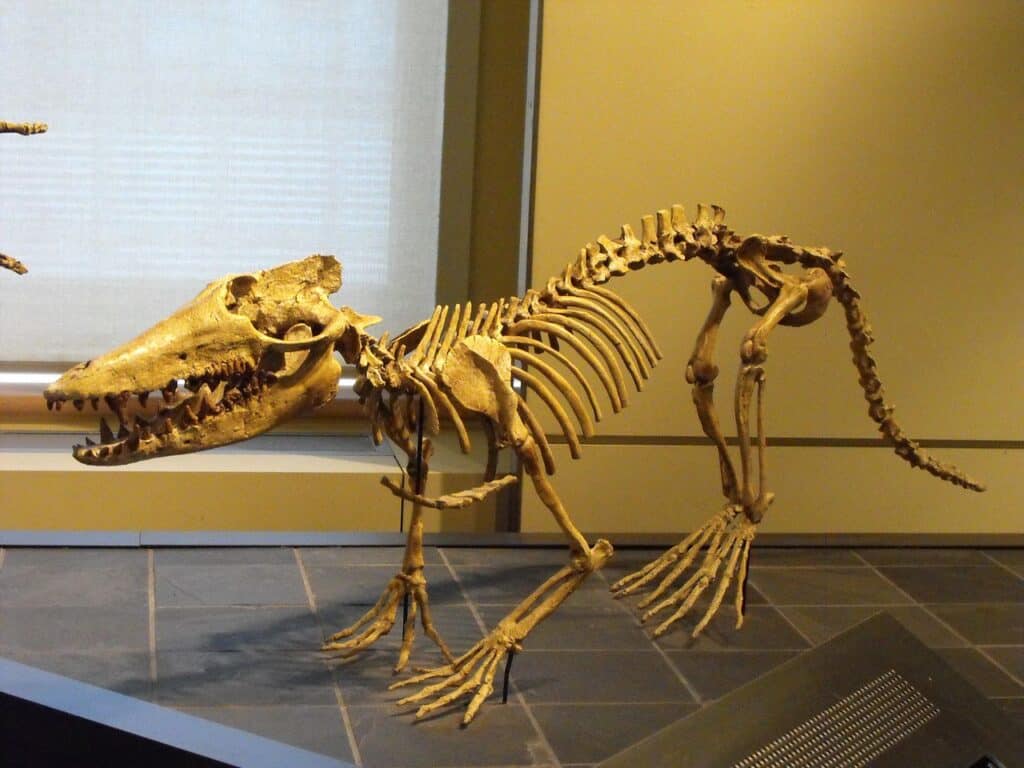
was a wolf-like, four-legged mammal that ate fish.
©Kevin Guertin from Ottawa, Ontario, Canada / CC BY-SA 2.0 – License
Before we look at the oldest whale fossil, we need to know what animal we’re looking at. After all, whales were not always the creatures that we know today. In fact, an ancestor of the whale had functional legs and was believed to be semi-aquatic at best.
Pakicetus inachus was a wolf-like, four-legged mammal that ate fish and other small animals. Scientists believe this animal lived along shorelines and had webbed feet. The creature is often considered the species that marked the beginning of the differentiation between land mammals and whales. Fossils from this creature were located in the Kuldana Formation in Pakistan, and it’s believed that they date as far back as 56 to 41 million years ago.
Now, you may be wondering how scientists looked at a mammal and believed that it was one of the creatures that evolved into modern whales. The answer lies in the animal’s physical features. Fossils of Pakicetus had ear bone structures and ankle bones that are only found in cetaceans. The fossils also displayed an elongated skull that is found in whales.
Still, Pakicetus was merely an ancestor of whales. It was not the oldest whale. We have to go forward in time from the emergence of the Pakicetus to find the oldest whale in existence and its fossils.
When Did Whales First Appear?
The first whale relatives appeared about 50 million years ago. Pakicetus is often referred to as the first whale even though it is nothing like the whales that inhabit the oceans in the present day. This creature probably spent a lot of time near the shoreline.
Other early cetaceans, like those belonging to the Maiacetus genus, spent a lot of time in the water but also walked upon and gave birth on land. Fossil records suggest that this creature lived about 47.5 million years ago. Interestingly, fossils belonging to this genus were also found in Pakistan, this time in the Habib Rahi Formation.
Still, we did not get to fully aquatic creatures yet.
The First Aquatic Cetaceans
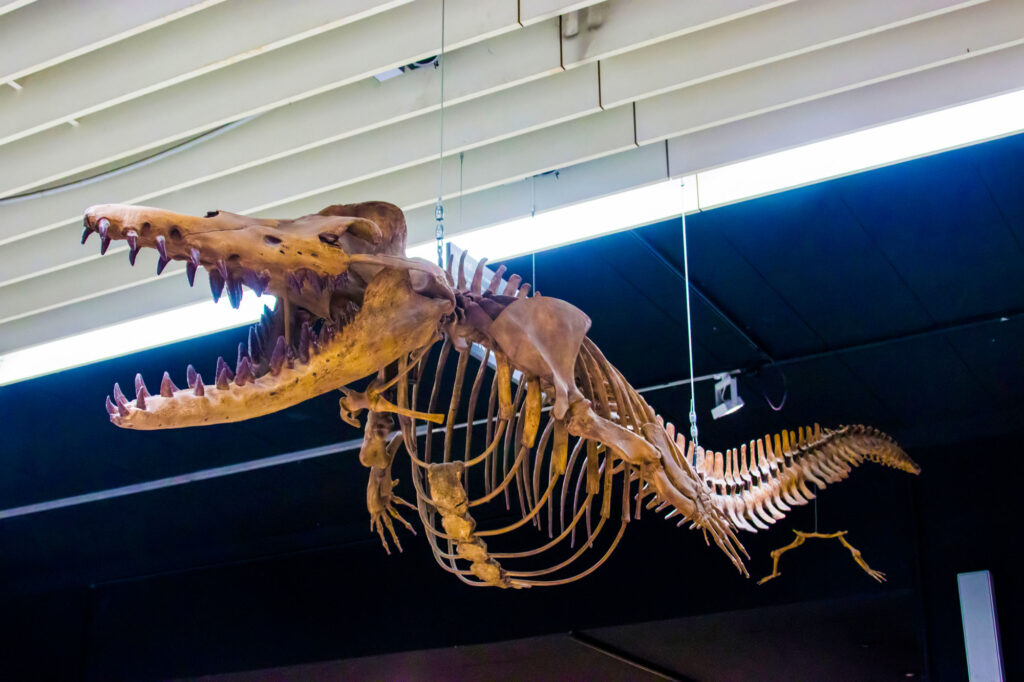
Members of the
Basilosaurusgenus were originally believed to be reptiles.
©Danny Ye/Shutterstock.com
Basilosaurids and Dorudontines were the first fully aquatic cetaceans that resemble something like modern whales, and they lived together at the same time. Both of these creatures lived about 41 to 33.9 million years ago, but the timeline is not exactly fixed. Both members of this family possessed small tail flukes and spent their entire lives in the water.
Interestingly, members of the Basilosaurus genus were originally believed to be reptiles, and that’s why they have the “-saurus” suffix attached to their name. However, these creatures were archaeocete whales, large marine mammals.
Now that we have identified some of the earliest genera of whales, we can finally talk about the oldest fossils on record.
How Old Was the Oldest Whale Fossil Ever Found?
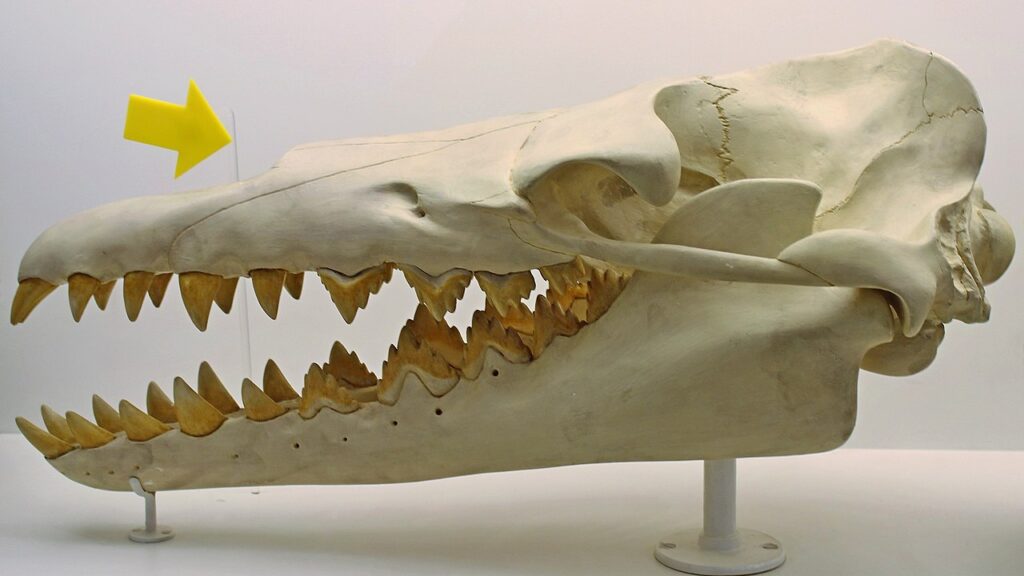
The Basilosaurus fossil is regarded as the oldest intact fossil ever found.
©Emőke Dénes / CC BY-SA 4.0 – License
The oldest whale fossil ever found is between 37 and 40 million years old. The intact fossil of a Basilosaurus, the most complete one ever found, was discovered in Wadi Al-Hitan, a site in Egypt. The fossil of the creature measured about 54 feet long!
Fossils of animals eaten by the Basilosaurus were also found where the creature’s stomach would have been. Also, shark teeth in the immediate area demonstrated how other creatures fed on the whale after it had died.
Another old whale fossil was discovered in March 2022, dating back as far as 36 million years. This Basilosaurus fossil was found in modern-day Peru. The discovery included a well-preserved skull that showed the creature was a vicious predator.
What Did the Oldest Whale Fossil Teach Us?
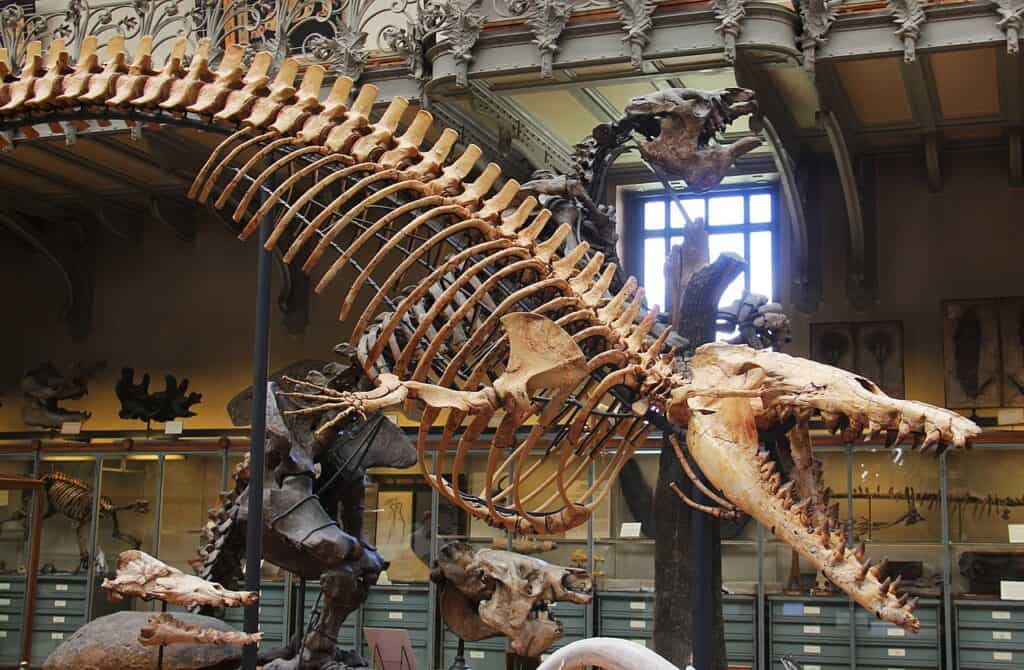
Whale fossils showed some of the diversity of sea creatures that existed at the time.
©Laika ac from UK / CC BY-SA 2.0 – License
The whale fossil discovered in Egypt was significant for a few reasons. For one thing, the fossil showed the tail spines of a member of the Basilosauridae genus for the first time. Also, the new fossil showed some of the diversity of sea creatures that existed at the time, including smaller whales, sawfish, and crabs.
Also, the fossil continues to strengthen the belief that the Basilosaurus was the first fully aquatic whale species. Another interesting thing is that fossils of Basilosaurus have been found in many places around the world. They’ve been found in Africa, the U.S., South America, and more. At least one fossil was also located in Antarctica, and it caused a bit of a stir.
Controversy in the Whale Fossil Record
A jawbone from a whale that lived near the Antarctic has potentially muddied the whale evolution timeline a bit. In 2011, scientists found a 24-inch fossil on the Antarctic Peninsula that was apparently 49 million years old.
Some scientists believed that it represented a fully aquatic creature when the discovery was made. Yet, other fully aquatic whales weren’t around for millions of years after that, according to the current fossil record.
However, a great deal about the fossil is up for debate, including whether it belonged to an aquatic creature or a true whale at all as well as the actual age of the fossil. Interestingly, the scientists that made the discovery have not released any new information about the discovery since it was made.
That could mean that the initial claims surrounding the discovery were not entirely accurate.
At the very least, the fossil discovery in Antarctica could mean the Wadi Al-Hitan discovery is not the oldest fossil found! We’ll post updates if anything changes on that front!
Up Next:
- What’s the Oldest Alligator Fossil Ever Found?
- The Oldest Grizzly Bear vs. the Oldest Polar Bear
- Discover the World’s Oldest Crocodile.
The photo featured at the top of this post is © Danny Ye/Shutterstock.com
Sources
- National History Museum, Available here: https://www.nhm.ac.uk/discover/when-whales-walked-on-four-legs.html#:~:text=It%20also%20used%20its%20tail%20for%20swimming.&text=Further%20along%20this%20evolutionary%20journey,and%20was%20a%20good%20swimmer
- IUCN, Available here: https://www.iucn.org/content/first-intact-fossil-prehistoric-whale-discovered-wadi-al-hitan#:~:text=The%20world's%20only%20intact%20fossil,World%20Heritage%20site%20in%20Egypt
Thank you for reading! Have some feedback for us? Contact the AZ Animals editorial team.




